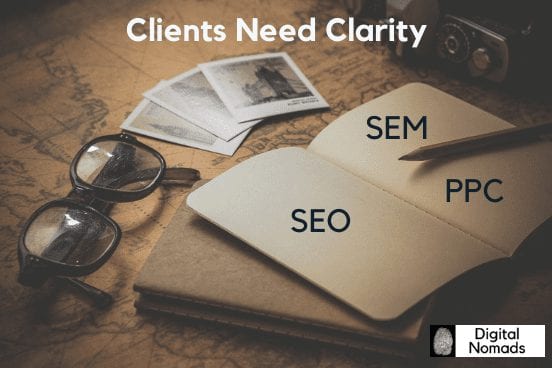
The Difference Between SEO, SEM & PPC
Introduction
We wrote this blog post to clarify the confusion arising from the different digital marketing terms which refer to the activities used to optimise your search engine rankings.
Around 2001, one of the most prominent search industry leaders Danny Sullivan started using the term “search engine marketing” for an overlapping category in the world of digital marketing that dealt with search engines. He wanted SEM to cover all search engine marketing initiatives, both organic and paid.
There was a time when SEM or search engine marketing was a comprehensive term used in the world of digital marketing to define both paid and non-paid search engine strategies.
This meant that either of its PPC ads (Pay-Per Click Advertisements) or SEO (Search Engine Optimization) organic search strategies, both could be a sub category of search engine marketing or SEM.
Therefore, SEM would be a marketing niche relating to search engines. And both PPC and SEO that are paid and non-paid search engine strategies would come under SEM.
The fact that both PPC and SEO fall under SEM stands true in its literal sense as well. But, just like any other phenomena such as language or culture, these categories cannot stick to a hard and fast rule. There have been and always will be some kind of exceptions.
It may seem to be a web of confusion. But, one cannot deny that the search industry does not conform with the fact that SEM only refers to the paid search initiatives.
How is SEM different from PPC?
PPC and SEM are one and the same.
This means that pay-per click ads and search engine marketing have much in common. It can also be said that PPC is an important part of SEM.
But, as far as SEO or search engine optimization is concerned, it has nothing particularly in common with PPC or SEM.
With time, there has been a lot of confusion regarding the use of these digital marketing terms, so much so that two of these terms are now believed to be one and the same. It is therefore really important to distinguish between the two and clarify which term stands for what.
Now, when it comes to PPC, there is no such confusion as to what it stands for. You may call it pay-per click, CPC (cost-per-click), or paid search, and still have an idea of what is being referred to. You’ll know that it has something to do with paid search marketing, especially in connection to search engines such as Google, Yahoo or Bing.
Due to the relevance of Google as the most used search engine around the world (not only in Hong Kong), the most important and effective PPC/CPC campaign every company can run is Google Ads. We have extensively written about it on our website.
On the other hand, there are certain digital marketing terms and acronyms that are related to both paid and non-paid search engine strategies that are not identified so easily.
How is SEO different from PPC?
It’s widely known that SEO stands for search engine optimization. Now be aware that search engine optimization does not mean that a marketer’s job is to optimize a search engine like Google. As a marketer, you will optimize content such as blog articles, web pages etc. to improve your ranking on search engines. Therefore, SEO focuses on engaging the audiences by being more accessible.
As discussed earlier, you already know that PPC ads and SEM are almost one and the same. Therefore, both PPC & SEM are paid tactics that require a certain budget as well.
But, if you’ll search the internet for the definition of SEM as per the popular opinion, you’ll see that it’s too early to use both terms for the same thing.
You’ll also notice that unlike SEM or search engine marketing, PPC or pay-per click marketing has a separate Wikipedia page. All this comes down to the conclusion that:
SEO is not a part of SEM.
On the whole, PPC or pay-per click is one of the most important constituents of SEM. Like SEM, PPC is also a paid tactic that offers safe and real time data to marketers with a focus on ROI.
What’s the need for clarification on these marketing terms?
There are many reasons to demand a clear understanding of these digital marketing terms and acronyms. But, one of the most relevant reasons to seek clarity about them is constancy.
The digital marketing world is flooded with newbies and amateurs who are not thorough in their understanding of these terms. At present, there are a lot of so called marketers who have no expertise in offering valuable services to clients. It is these marketers who have created a whole lot of confusion by mixing up many of these marketing terms. This is something that has caused disruption in the industry and contributed to temper the real meaning of these terms.
Apart from these novices, there is also a certain section of experienced search industry specialists that has contributed to this cross use of these terms. These are industry experts who too disagree with the previously held notions and usage of these terms and choose to comply with the new definitions.
There have been many efforts to define SEM in relation to paid initiatives, but not particularly through search engine platforms themselves. For instance, SEM not only covers PPC advertisements on Google, but also on other PPC platforms, social media and industry-centered websites; such as Amazon, Facebook and Linked-In respectively.
Perhaps, this is exactly why it is really imperative to ensure consistency in the use of these digital marketing terms and their definitions. This consistency is the key to make sure that information is in order, so that marketers all over the world can clearly know how to maximize value on search.
For any marketer, it is extremely important to know well how they are going to help their clients. As a marketer offering digital marketing services; you will need to talk in detail about your ideas and how they’ll contribute to the ROI of your clients. This is only possible, when there is consistency in the way industry information is spoken off and brought to practice.
 Using the right marketing terms for the right people & setting
Using the right marketing terms for the right people & setting
One of the most important things that marketers need to keep in mind, while sharing their brand building ideas and strategies with clients is to maintain uniformity in their use of digital marketing terms. This is especially relevant in terms of marketing that is focused on “search”. You also need to see that the language you are using is easily comprehended by your clients.
There is no doubt about the fact that about 80% of non-marketers will not be able to differentiate between the most commonly used marketing terms. So, if you are talking about PPC and SEO with an individual who is not acquainted with these terms, then it is your responsibility to define these terms clearly.
It happens all the time when a client goes on to think that SEO is helping come up with paid search ads. So, in order to keep your client from any such confusion, you must stress on how the two are different from each other while pitching in your services. On the other hand it should be explained, like we did here, how and why paid search ads represent an important aspect of the SEO strategy.
First and foremost, you need to have a clear understanding of these terms on a basic level. As per the definitions below:
- SEM (Search Engine Marketing) and PPC (Pay-Per Click) are paid strategies on search engines, as well as various other online marketing platforms.
- SEO (Search Engine Optimization) is an organic marketing strategy that is pushed through search engine platforms.
Another crucial thing is know who your audience is. Knowledge level of each client will differ from person to person. Thereby, as far as digital marketing and search marketing is concerned, you must keep in mind the type of audience you are dealing with.
Here are a few other factors that a marketer must discuss in full length with potential clients:
- Meaning of each and every search marketing term used in the conversation.
- How it works.
- How it is related to the specific business goal of your client.
Last, but not least marketers should never take for granted that a potential client has any knowledge about what they are talking about or the terms brought in the conversation such as SEO, SEM or PPC.
Conclusion
It’s our responsibility as marketers to make sure to be clear when explaining the meaning of these marketing terms and how they will help our client’s goals.
At Digital Nomads we think that it’s crucial that our clients understand immediately which strategies we have in mind to enhance their online presence and boost their lead generation. We strive to ensure a clear communication which aligns our expertise with the expectations of the companies we work with. Don’t wait longer to clarify the doubts you have in your mind about the best digital marketing strategies for your business, get in touch with us for a free consult!

 Using the right marketing terms for the right people & setting
Using the right marketing terms for the right people & setting